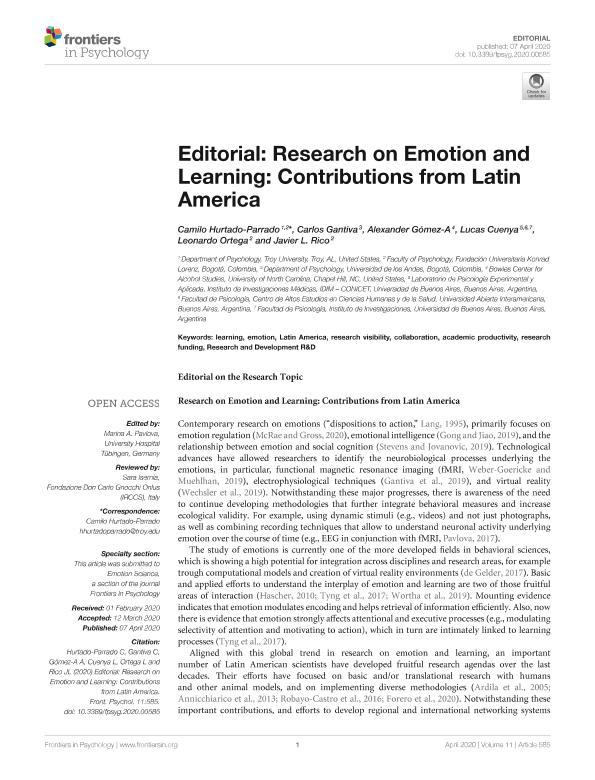Mostrar el registro sencillo del ítem
dc.contributor.author
Hurtado Parrado, Camilo
dc.contributor.author
Gantiva, Carlos
dc.contributor.author
Gómez A., Alexander
dc.contributor.author
Cuenya, Lucas

dc.contributor.author
Ortega, Leonardo
dc.contributor.author
Rico, Javier L.
dc.date.available
2020-06-03T20:25:03Z
dc.date.issued
2020-04
dc.identifier.citation
Hurtado Parrado, Camilo; Gantiva, Carlos; Gómez A., Alexander; Cuenya, Lucas; Ortega, Leonardo; et al.; Editorial: Research on emotion and learning: contributions from Latin America; Frontiers Research Foundation; Frontiers in Psychology; 11; 4-2020; 1-4
dc.identifier.issn
1664-1078
dc.identifier.uri
http://hdl.handle.net/11336/106639
dc.description.abstract
Latin America has increased its share of world scientific publications by nearly twofold during the last two decades (approximately from 2 to 4%). Despite this positive trend, the scholarly impact of scientific research produced in the region - measured in terms of citation rate - remains low. Two interrelated factors that contribute to this situation is that most research groups tend to work in isolation or in local sporadic collaboration, and results are often published in journals that are not indexed in major citation databases (e.g., SCOPUS, or Web of Science). Ultimately, part of Latin American high-quality research seems to remain hidden from the rest of the world. Over the last decades, an important number of Latin American scientists have developed fruitful research agendas on questions on learning and emotion, focusing on basic and/or translational research with humans and other animal models, and implementing diverse methodologies. Notwithstanding the important contributions of these research programs, Latin American research on emotion and learning has followed the overall trend of other research fields throughout the region; namely, remaining partially hidden from the large scientific community of the world. This Research Topic aimed to engage researchers from Latin America to share their empirical and conceptual work on learning and emotion. Ultimately, this effort was expected to strengthen and integrate our regional community of experts, enhance global networking, and establish new challenges and developments for future investigation.
dc.format
application/pdf
dc.language.iso
eng
dc.publisher
Frontiers Research Foundation

dc.rights
info:eu-repo/semantics/openAccess
dc.rights.uri
https://creativecommons.org/licenses/by/2.5/ar/
dc.subject
LEARNING
dc.subject
EMOTION
dc.subject
LATIN AMERICA
dc.subject
RESEARCH VISIBILITY
dc.subject
ACADEMIC PRODUCTIVITY
dc.subject
RESEARCH FUNDING
dc.subject.classification
Otras Psicología

dc.subject.classification
Psicología

dc.subject.classification
CIENCIAS SOCIALES

dc.title
Editorial: Research on emotion and learning: contributions from Latin America
dc.type
info:eu-repo/semantics/article
dc.type
info:ar-repo/semantics/artículo
dc.type
info:eu-repo/semantics/publishedVersion
dc.date.updated
2020-05-27T16:27:14Z
dc.journal.volume
11
dc.journal.pagination
1-4
dc.journal.pais
Suiza

dc.description.fil
Fil: Hurtado Parrado, Camilo. Fundación Universitaria Konrad Lorenz; Colombia
dc.description.fil
Fil: Gantiva, Carlos. Universidad de Los Andes; Venezuela
dc.description.fil
Fil: Gómez A., Alexander. University of North Carolina; Estados Unidos
dc.description.fil
Fil: Cuenya, Lucas. Consejo Nacional de Investigaciones Científicas y Técnicas. Oficina de Coordinación Administrativa Houssay. Instituto de Investigaciones Médicas. Universidad de Buenos Aires. Facultad de Medicina. Instituto de Investigaciones Médicas; Argentina
dc.description.fil
Fil: Ortega, Leonardo. Fundación Universitaria Konrad Lorenz; Colombia
dc.description.fil
Fil: Rico, Javier L.. Fundación Universitaria Konrad Lorenz; Colombia
dc.journal.title
Frontiers in Psychology
dc.relation.alternativeid
info:eu-repo/semantics/altIdentifier/url/https://www.frontiersin.org/article/10.3389/fpsyg.2020.00585/full
dc.relation.alternativeid
info:eu-repo/semantics/altIdentifier/doi/http://dx.doi.org/10.3389/fpsyg.2020.00585
Archivos asociados
